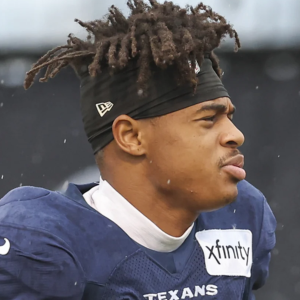The Chicago Bears offensive line should be better than many fans analysts think after returning most of their starters from a unit that gave up 50 sacks last season. The Bears gave up the seventh most sacks in the league during the 2023 season. But much of the blame lies with former Bears quarterback Justin Fields.
Hard to judge the 2023 Chicago Bears OL
Pro Football Focus ranked the Bears’ offensive line 23rd in pass blocking for the 2023 season. ESPN’s pass block win rate statistics tell a different story. Left tackle Braxton Jones won the fifth-most pass blocks of any offensive tackle in the league last year. As a unit, the Bears won 64 percent of their pass blocks, enough to rank as the fifth-best unit in the league in the statistic.
Justin Fields held on to the ball too long
Aaron Schatz (the creator of the DVOA stat) with FTN recently released his pro football almanac for the 2024 season. Schatz noted there was a “discrepancy” between the Bears offensive line’s pass block win rate and the pressures the unit gave up. He hinted Fields was partly to blame for the pressures:
“No offensive line had a bigger discrepancy between tracking and charting stats. ESPN’s pass block win rate, which measures“wins” within the first 2.5 seconds of the snap, had the Bears fifth in 2023. FTN Data charted the same line with the thirdhighest pressure rate allowed. With Justin Fields, the Bears averaged the longest time to throw, 3.08 seconds, per Next Gen Stats”
CCS spoke to Schatz about the disparity between winning their pass blocks but giving up pressures. Schatz said much of the pressures the Bears gave up last season was due to the style of Fields’ play.
“Part of that is Fields’ fault; you give up pressures because Fields draws pressures,” Schatz said. “Right, it’s interesting. Sacks are heavily a quarterback stat, not entirely. Pressures are also a lot a quarterback stat, although I’d say pressures are less a quarterback stat than sacks are.”
Fields said early last season that he didn’t want to overthink during games and wanted to play free. Some of that freedom meant his teammates were put in positions they couldn’t succeed.
“Fields definitely put himself in position to be pressured, which means his offensive line was going to be blamed for pressures, and given the way Fields played, it is hard to judge the Chicago offensive line,” Schatz said.
The OL was good at run blocking
Schatz noted that the Bears’ offensive line was good at run blocking, which he said an offensive line has more control over than pass blocking.
Per ESPN, the Bears had the second-best win rate (75%) for run blocking last season. Given the change at quarterback this season, the Bears offensive line should look better in pass protection. That is, If Caleb Williams dishes the ball quicker than Fields.
Williams held on to the ball longer during his final year at USC than Fields did with the Bears last year.





